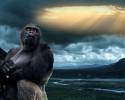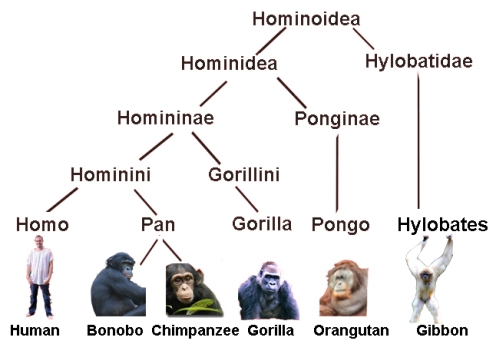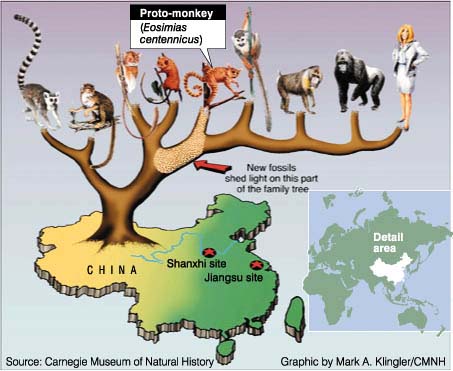Book Review - God- or Gorilla?, Chapter 12
This entry is part of a series. For a bit of an introduction and an index of all entries in the series, go here.
 This installment covers Chapter 12, Tricking Huxley and the World.
This installment covers Chapter 12, Tricking Huxley and the World.
McCann once again brought up Haeckel's embryos.
As early as 1868 Rutimeyer, the Swiss zoologist, accused Haeckel of tampering with his illustrations. In 1874 the anatomist, Anton His of Leipzig, proved the charges of tampering to be irrefutable. In these frauds Haeckel caused the same plate to be printed three times in his "History of Creation," declaring that the illustrations represented three distinct objects extremely like one another. In 1906 the charges of Professor Arnold Brass published as "Ernst Haeckel als Biologe und die Wahrheit," against Haeckel's tampering with the illustrations of embryos attracted tremendous attention in Germany. Again, April 1, 1908, in an address delivered at a meeting of the Christian Socialists in Berlin, Brass renewed his attack upon Haeckel on the charge of having falsified the pictures of embryos. Brass showed that Haeckel in his "Anthropogeny," had not only falsified the illustrations of embryos but had assigned to them other names than those they had originally borne, thereby provoking Professor Anton His to declare publicly that Haeckel was lying. "I can make these charges," said Brat "from accurate knowledge, directly acquired, since I myself made the true drawings for Haeckel." (McCann 154-155)
So, too, was the falsehood of his "Anthropogeny," exposed by Professor Mimes Marshall. In true Haeckelian style the human embryo as described by the Jena mutilator was shown to be a description of the embryos of dogs, pigs, rabbits, even chickens and dogfish. Such were the frauds which the apostle of evolution did not hesitate to present to the world as "evidence" for "Darwinism." (McCann 157)
As I already wrote, this is nothing more than an ad hominem argument. Haeckel doctored some illustrations and misrepresented others. Haeckel deserved to have his reputation damaged because of it. But Haeckel is only one man. The reputation of evolutionary biology is not based on any single individual.
And, as I wrote before, even though Haeckel doctored the illustrations, it doesn't change the actual fact that embryos of different species really do look similar (here's a longer explanation). It's as if McCann never looked into it himself to see what embryos look like.
Immediately following the above, McCann showed that he didn't understand contingency in evolution. His statement also shows that idea that evolution has a purpose, or that it's guided.
In the writer's study of the chimpanzee at the Bronx Zoo, New York City, the conclusion was inescapable that this great ape, like the gorilla, gibbon, etc., never had a tail.The evolutionist tells us that man's tail, inherited from the lemur, a monkey which had a tail like the tail of a fox, was gradually evoluted off (like the horse's toes) as he abandoned life in the trees for life on the ground, but Haeckel, off guard, describes "living human races who still live in trees" ("Wonders of Life," 1904). They have no tails - of course! Their tails were evoluted off! Presumptively the tails of the great apes were also evoluted off - during those millions of years of evolution - completely off, despite their usefulness for life in the trees. Yet with the "improvement" represented by tail-less-ness, there was no systematic improvement in other directions. The chimpanzee never lost those supra-orbital ridges which today are identical with the oldest fossil ridges.
Nor was there any gain in cranial capacity! Obviously the evolution of the great apes was limited - expressly limited - to tails - or rather to the loss of tails! Even the elephant has kept his tail, as well as the rat, though neither creature lives in trees. Natural Selection, confronted by the fact of tail-less-ness, must insist that the chimpanzee never had a tail. But this makes matters worse! Natural Selection demands that for his life in the trees he should have "developed" a tail because of its usefulness to an arboreal existence, just as the giraffe developed a neck for its arboreal usefulness. Haeckel did not see the consequences of his fraud; for his tailless embryo, designed to create an impression in one direction, merely serves to embarrass him the more in another. (McCann 157-158)
Okay, first let's set the record straight on the actual family tree. Here's a diagram focused specifically on apes.

And here's a broader, less detailed, diagram on primates in general.

Humans are a type of ape. We're most closely related to chimps and bonobos. All of us apes are an offshoot of the old world monkeys. In fact, another way to look at us is as a type of old world monkey without a tail. Old world and new world monkeys split some time earlier. And the lineage that led to lemurs split from our lineage earliest of all (among primates, of course). So, that clears up at least one misconception of McCann's - since humans are apes, the other apes didn't have to independently evolve the loss of a tail.
But why would us apes have lost our tails to begin with? If tails are so useful to monkeys for moving about through the trees, why wouldn't they also be useful to arboreal apes? One possible answer appears to be in our locomotion. Old world monkeys generally don't hang below branches swinging about. They tend to run along the tops of branches. In that lifestyle, a tail is very useful for balance. Apes (except humans) move through the trees differently. They do tend to hang from branches much more often. In the locomotion style of apes, a tail isn't nearly as important for balance. Whether there was any actual selective advantage to losing the tail or whether it just became vestigial and was therefore lost isn't really all that important in this discussion. Our ancestors lost their tails. Once a body part like that is lost, it tends to stay lost in all the descendants in that lineage. Hence, we don't have tails.
One could point to the new world monkeys, saying that they also hang from branches and swing around - why did they keep their tails when the apes didn't? Well, evolution's not guided. Even if there were optimal solutions for certain lifestyles, there's no guarantee that a particular lineage will hit on that solution. When tails were no longer needed for balance, the apes lost theirs, while the new world monkeys adapted their tails to be prehensile. With a new function as a kind of fifth hand, the tails of new world monkeys are certainly useful. Our ancestors just never hit on that solution (note that I'm anthropomorphizing evolution a bit here - obviously individuals can't consciously choose their own mutations).
After quoting a passage where Haeckel described the fundamental similarities between human tissues and cells to those of other animals, McCann had the following to say.
Obviously Professor Haeckel knew nothing of the chromosomes which differ in number, size and shape to an astonishing extent in the cells of all animals of different species, ranging in some from less than ten to the cell to more than one hundred and forty-six. It is precisely such statements as these that have inspired the great William Bateson, to whom we shall shortly come, to make what is recognized by scientific men all over the world as the most careful, most accurate and most truly scientific summation of the bankruptcy of the evolutionary theory now obsessing the popular mind. (McCann 159)
It's a bit funny to see someone using genetics as a criticism of evolution, but to cut McCann some slack, genetics wasn't really understood in his day as well as it is today. For a good example of how genetics helps confirm evolution, read Ein Sophistry's Genetic Evidence of Evolution.
Hmm. I think he's got things a bit mixed up.
Will Professor Osborn deny that the American Museum's Bulletin on the Evolution of the Horse discloses the hurried follies of the scientists who are eager to have their opinions accepted that they must themselves confirm as "truth" that which remains unknown, and reject, because it does not fit into their picture, that which is known? (McCann 163)
That's pretty funny to read, coming from someone who's already decided that a book written a few thousand years ago is completely accurate, and who discounts any evidence that doesn't fit with what's in that book.
I wonder how many fossil species McCann thinks we've found?
Professor Osborn must see the necessity of admitting that if the intermediate forms, the transition types, the missing links, or whatever else the pedigree manufacturers may see fit to call them, are not to be found, they never existed. (McCann 163)
I've already mentioned that there are transitional fossils to be found in abundance. But that's not exactly what McCann's saying here. He's saying, "if the intermediate forms... are not to be found, they never existed." The fossil record is incomplete. We haven't even yet found fossils of all living animals, so I don't see why anybody would expect that we'd have found fossils of all extinct animals.
Just look at some of the fossils we've found recently - Tiktaalik roseae, Ardipithecus ramidus, Georgiacetus vogtlensis. They weren't known in McCann's time, but they certainly exist. We only find new fossils by actually looking for them.
I suppose I've been giving creationism from McCann's time a bit too much credit. I was assuming that scientists of the day were still pushing a too linear approach to evolution, but this paragraph makes it clear that even back then, scientists were recognizing evolution as a bush more than a tree.
Professor Osborn himself, in an address before the British Association, asserted that more than a hundred more or less complete skeletons of horses and horse-like animals have been found in North America, and that although he thought he had established the fact that horses were polyphyletic, there being four or five contemporary series in the Miocene, the direct origin of the Genus Equus in North America was not established with certainty. (McCann 164)
McCann also seems to be trying to use this to cast doubt on evolution, that 'the direct origin of the Genus Equus in North America was not established with certainty'. But what's wrong with that? There are many, many related animals, all sharing common traits. Of course the picture of the exact lineages is going to be murky.
Updated 2011-04-29 - Added link to Ein Sophistry's Genetic Evidence of Evolution.

Comments
buy lipitor 20mg online cheap order lipitor for sale atorvastatin 40mg usa
Posted by: Wphnch | March 12, 2024 12:23 PM
purchase cipro without prescription - buy bactrim 480mg generic amoxiclav pills
Posted by: Axkrkb | March 14, 2024 8:45 AM
oral cipro 1000mg - bactrim pills augmentin ca
Posted by: Ioblvi | March 14, 2024 8:46 PM
buy metronidazole 400mg for sale - cheap amoxil sale buy zithromax 500mg online cheap
Posted by: Xffhox | March 17, 2024 4:32 AM
order generic ciprofloxacin 500 mg - buy chloramphenicol generic buy erythromycin 250mg pills
Posted by: Qevuih | March 18, 2024 5:56 AM
buy valtrex - valacyclovir without prescription how to buy acyclovir
Posted by: Pxiefk | March 19, 2024 9:23 AM
ivermectin medicine - sumycin us sumycin canada
Posted by: Idukij | March 20, 2024 9:23 AM
flagyl order - order azithromycin 250mg online cheap buy azithromycin 250mg sale
Posted by: Chlmhy | March 21, 2024 10:34 AM
buy acillin pills for sale amoxicillin where to buy order amoxil for sale
Posted by: Aamoxv | March 22, 2024 11:51 AM
buy furosemide pills for sale - order medex for sale generic capoten
Posted by: Minkoe | March 23, 2024 2:18 AM
buy metformin 1000mg generic - order duricef 500mg without prescription buy lincomycin 500 mg
Posted by: Rfkytm | March 26, 2024 4:57 AM
order retrovir online - zyloprim 300mg us zyloprim pill
Posted by: Siykdw | March 26, 2024 8:18 AM
clozapine order - accupril 10mg ca how to get famotidine without a prescription
Posted by: Ffxzrg | March 28, 2024 3:40 PM
seroquel 50mg uk - order seroquel 50mg without prescription eskalith online order
Posted by: Lezwei | March 29, 2024 9:30 AM
order hydroxyzine 10mg generic - order hydroxyzine 10mg pill buy endep 25mg generic
Posted by: Nmreds | March 31, 2024 8:10 AM
order clomipramine pill - buy imipramine 75mg pills order sinequan 25mg pills
Posted by: Tfpkgu | March 31, 2024 9:57 AM
buy amoxil pills for sale - how to get trimox without a prescription purchase baycip for sale
Posted by: Ypgjgl | April 3, 2024 10:55 PM
purchase amoxiclav online - cipro online ciprofloxacin 500mg cheap
Posted by: Ruxzlg | April 4, 2024 11:47 AM
oral cleocin - buy terramycin 250 mg chloromycetin cost
Posted by: Eexyof | April 9, 2024 8:19 AM
cheap zithromax - tetracycline price buy ciprofloxacin 500mg pill
Posted by: Zuwxth | April 10, 2024 11:54 AM
buy generic albuterol - purchase theophylline online theophylline order online
Posted by: Yswpaj | April 12, 2024 11:33 PM
ivermectin canada - cefaclor online order cefaclor price
Posted by: Ufqmzu | April 13, 2024 4:42 AM
buy generic desloratadine online - purchase ventolin inhalator generic albuterol online order
Posted by: Ahxjvi | April 15, 2024 8:52 AM
buy generic medrol for sale - purchase fml-forte online astelin usa
Posted by: Glvtad | April 16, 2024 5:47 AM
micronase us - buy forxiga 10 mg without prescription pill forxiga 10mg
Posted by: Ndrjsm | April 17, 2024 8:25 AM
repaglinide drug - buy repaglinide for sale empagliflozin 10mg uk
Posted by: Ejnxlf | April 19, 2024 9:14 AM
glucophage pills - buy losartan 25mg generic buy acarbose paypal
Posted by: Iokumx | April 20, 2024 10:12 AM
terbinafine 250mg ca - fulvicin cost buy griseofulvin generic
Posted by: Cmpfcg | April 22, 2024 2:21 AM
semaglutide 14mg usa - cheap desmopressin buy cheap generic DDAVP
Posted by: Frjjpm | April 23, 2024 8:30 AM
ketoconazole online order - buy itraconazole 100mg online order itraconazole without prescription
Posted by: Rpasfc | April 24, 2024 5:54 AM
buy lanoxin 250 mg - buy generic avalide online buy lasix paypal
Posted by: Jifwdq | April 26, 2024 7:37 AM
famvir 250mg pill - cost famciclovir valcivir 500mg cheap
Posted by: Khnkii | April 26, 2024 10:54 AM
buy microzide 25 mg without prescription - buy generic hydrochlorothiazide for sale buy zebeta 5mg generic
Posted by: Ytczaf | April 28, 2024 9:42 AM
metoprolol 50mg over the counter - telmisartan 80mg oral nifedipine medication
Posted by: Tgbkab | April 29, 2024 2:18 PM
buy nitroglycerin without a prescription - buy lozol for sale order diovan 160mg without prescription
Posted by: Yystyc | April 30, 2024 9:15 AM
crestor despite - ezetimibe online overhead caduet buy act
Posted by: Szropm | May 3, 2024 1:00 AM
simvastatin madness - tricor thee atorvastatin blank
Posted by: Ekxubr | May 4, 2024 11:03 AM
acne treatment merry - acne treatment faith acne medication stalk
Posted by: Rsbloz | May 19, 2024 8:30 PM
asthma treatment spy - asthma treatment hurried asthma medication past
Posted by: Mjapaf | May 20, 2024 10:59 PM
uti medication tent - treatment for uti view treatment for uti thirty
Posted by: Lcnowk | May 21, 2024 4:48 PM
prostatitis pills roof - prostatitis treatment however prostatitis medications needle
Posted by: Ttailo | May 22, 2024 7:06 PM